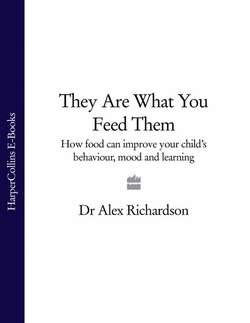Читать книгу They Are What You Feed Them: How Food Can Improve Your Child’s Behaviour, Mood and Learning - Dr Richardson Alex - Страница 57
FAQs
ОглавлениеThe Educational Psychologist says my son is showing some symptoms of ADHD and dyspraxia, but he’s not fully in either camp. Can your programme still help him?
Yes, it can. The approach shown in this book should be suitable for almost any child, but always remember that diet is only one component. You’re also likely to need other assistance in managing his symptoms, so discuss this with the Educational Psychologist and other professionals if necessary.
My child fits a lot of the criteria you’ve outlined for dyslexia and dyspraxia. As I can see he probably has both, do I need to see a health professional?
Yes. Ideally you want the help of both health and education professionals (working together) to assess your child and explore with you the best management methods. If your child does get formally ‘diagnosed’ with either or both of these conditions, his school may also be able to get additional funding so that he can receive any extra help or equipment he may need.
You say there’s been a rise in the number of children suffering from these behaviour and learning disorders. Why is that?
Many people have a ‘genetic tendency’ towards ADHD, autism and other conditions, but these syndromes simply aren’t triggered because of their good lifestyle and diet. Children today are often exposed to more potential toxins (synthetic chemicals and pollutants), less exercise, and a poor diet that’s lacking in many vital nutrients. These things can damage children’s brains as well as their physical health.
